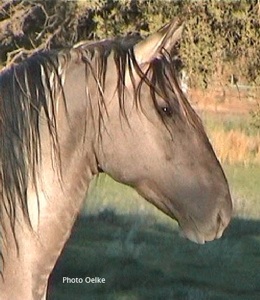"SORRAIA MUSTANG", OR SIMPLY "SORRAIA"?
I can see the close resemblance of some of our American Mustangs, some Kigers especially, to some photographs I have seen of Portuguese Sorraias. And so I can see where the Sorraia Mustang comes from. I can also imagine how the Sorraia Mustang could play a role in the preservation of the Sorraia. However, then I hear that Sorraia Mustangs are a whole 'nuther thing from Portuguese Sorraias – not to get them confused. Which, to me, makes the Sorraia Mustangs seem insignificant. I feel like I'm missing part of the big picture.
I love the Kigers. If I can be convinced that the Sorraia thing is really about preservation and not just some slick way for a few people to make a bunch of money, then I am happy to do what I can to help.
Someone saying that the Sorraia Mustang is different and not to be confused with Portuguese Sorraias could be meaning that in a correct way, but it can also be meant to question the whole Sorraia Mustang project. If one doesn't view Sorraia Mustangs of good type as having a similar status as the Portuguese ones (with both not being absolutely pure anymore), then one could indeed consider the whole effort meaningless.
Because these Sorraia-type mustangs seem to have inherited "a lot of Sorraia", they certainly seem to be worthwhile preserving. Their Sorraia genes must be considered worthwhile preserving… Bringing them together with those of other Sorraia Mustangs, or even Portuguese Sorraias, in order to "strengthen the genes", will, in the long run, result in horses indistinguishable in phenotype from the Portuguese Sorraias.
Left: This Sorraia Mustang of Kiger origin is
as good in type as any Sorraias in Portugal
On the other hand, whoever said the two must not be confused, may simply be concerned about clarity and truthfulness. The development over the last few years was like this: At first, Americans had hardly ever heard of Sorraias; if they had, they didn't have a very clear idea of them, plus they had been fed incorrect information. Then some got interested, and when they heard about Sorraia-type mustangs, they got interested in those. Next, some started to question the Sorraia, and question the Sorraia Mustang, but with many, the Sorraia-type mustang became a household word. Pretty soon, people started to brag about their "Sorraia type" mustangs", some of which had only a foggy idea of what a Sorraia looks like, and often their horses were a far cry from Sorraia type. All of a sudden, some people even started to simply refer to their mustangs as "Sorraias" (which may not even have been Sorraia in type, let alone registered SMS). They just nonchalantly called their mustangs "Sorraias". That's where things go out of hand, and why it is important to differentiate between Portuguese Sorraias and Sorraia Mustangs.
Right now we have a situation where we find many mustangs with Sorraia characteristics, but only few that totally look like a Sorraia. While it's obvious that we are dealing with horses which have the potential and deserve recognition and preservation, we must not ignore that they are "contaminated". Only through a determined breeding effort can we hope to arrive at a population of Sorraia Mustangs that breed true, and as a whole resemble the Portuguese Sorraia in phenotype.
I would advocate to always have different terms for the two, just to be above-board and honest about things. The term "Sorraia Mustang" was chosen because these horses have a mustang background. It may not be an ideal label for them, but it works, at least for now. The goal is to preserve the Sorraia genes, not to deny their mustang background, or deliberately cover their origin and try "selling" them as being the same as Portuguese Sorraias.
Another aspect is: Portuguese Sorraia people appreciate the Sorraia Mustangs for what they are, and recognize their Sorraia ancestry. They would certainly frown upon anyone who is simply declaring their mustangs to be "Sorraias", lumping them together with their horses, and would likely oppose the Sorraia Mustang project if they felt something "fishy" was going on.

